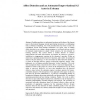Free Online Productivity Tools
i2Speak
i2Symbol
i2OCR
iTex2Img
iWeb2Print
iWeb2Shot
i2Type
iPdf2Split
iPdf2Merge
i2Bopomofo
i2Arabic
i2Style
i2Image
i2PDF
iLatex2Rtf
Sci2ools
AIHC
2007
Springer
2007
Springer
Affect Detection and an Automated Improvisational AI Actor in E-Drama
Enabling machines to understand emotions and feelings of the human users in their natural language textual input during interaction is a challenging issue in Human Computing. Our work presented here has tried to make our contribution toward such machine automation. We report work on adding affect-detection to an existing e-drama program, a text-based software system for dramatic improvisation in simple virtual scenarios, for use primarily in learning contexts. The system allows a human director to monitor improvisations and make interventions, for instance in reaction to excessive, insufficient or inappropriate emotions in the characters’ speeches. Within an endeavour to partially automate directors’ functions, and to allow for automated affective bit-part characters, we have developed an affect-detection module. It is aimed at detecting affective aspects (concerning emotions, moods, value judgments, etc.) of human-controlled characters’ textual “speeches”. The work also acco...
Affective Bit-part Character | Affective States | AIHC 2007 | Applied Computing | Language Textual Input |
| Added | 07 Jun 2010 |
| Updated | 07 Jun 2010 |
| Type | Conference |
| Year | 2007 |
| Where | AIHC |
| Authors | Li Zhang, Marco Gillies, John A. Barnden, Robert J. Hendley, Mark G. Lee, Alan M. Wallington |
Comments (0)

